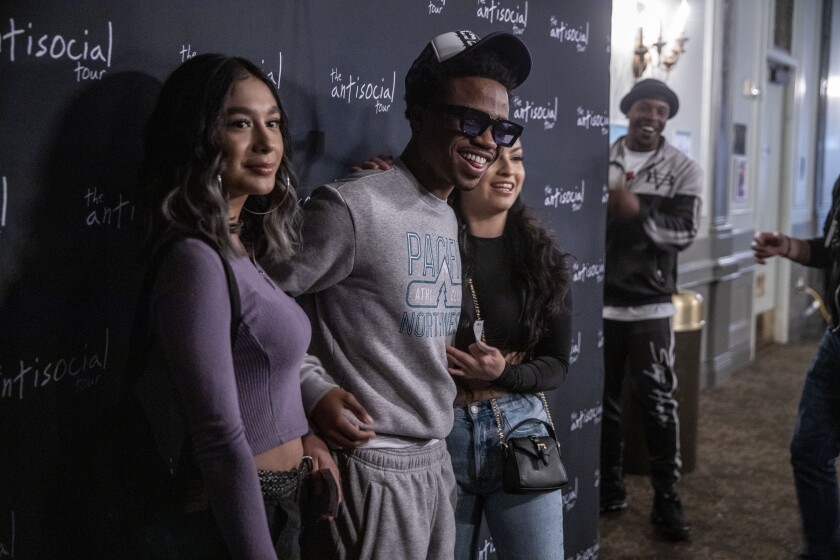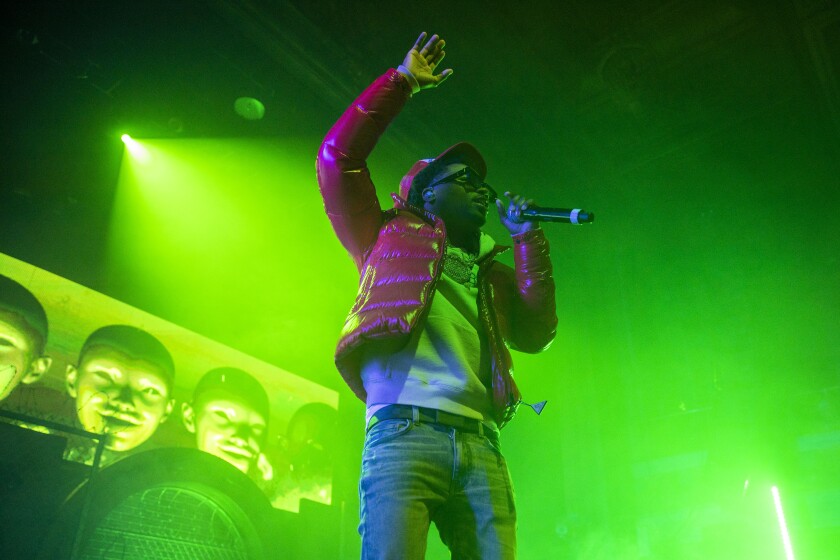
Around 6 p.m. on a Friday night, Roddy Ricch’s new single “Boom Boom Room” bludgeoned the near-empty Regency Ballroom in San Francisco. The 21-year-old Compton rapper’s crew was locking in the mix for the night’s show, and the deep bass and crackling snares had already drawn a crowd of superfans outside. The song’s lyrics — “Bought a big Patek with a brand new wrist setting / I’m a slide in the Rolls, slide in the Lamb, slide in the Benz” — set a triumphant tone for the home-state crowd.
But Ricch wasn’t anywhere in sight. Instead, his guitarist stood a little sheepishly at the mic, crooning the hook with exaggerated tenderness. Strobes and fog machines blasted the room, but the star was missing.
Then, alone in the dimly lit back of the venue, Ricch stepped forward, wearing a gray sweatsuit and sunglasses. He cracked up at his bandmate’s gentle rendition of the tune, taken from an album which, at that moment, was No. 1 in America.
“Alright,” he said, climbing back onstage and nodding to his sound tech. “Let’s do ‘The Box’ next.”

Over the last month and a half, Ricch watched his debut studio album, “Please Excuse Me for Being Antisocial,” twice ascend the Billboard 200 album chart. The second time, it was on the strength of “The Box,” an exquisitely meme-able, melodically irresistible single so potent it thwarted Justin Bieber’s comeback “Yummy” from leading the Billboard Hot 100. Topping both charts simultaneously is a rare feat for a rap artist. Ricch has only Kanye West, 50 Cent and the Notorious B.I.G. for company.
“The Box” wasn’t even supposed to be a proper single. Yet there was Ricch — the new decade’s first streaming megastar, three-time Grammy nominee, the hottest new rapper in L.A. and maybe the world — watching it all happen from the back of the room.
“I’m definitely eating better,” Ricch said, pounding a mug of hot tea before the set. “But I can’t say I’m a superstar yet.”
Hip-hop, more than any genre, moves at a head-spinning pace today. Stars, sounds and scenes arrive, ascend and flame out before artists hit their mid 20s. A huge streaming single can launch you from bedroom obscurity to a seven-figure record deal in weeks. Fentanyl or a violent life can end it just as quickly.
In the basement of the Regency, a few hours before showtime, it was obvious why Ricch hits all the marks of a rap sensation today. The 21-year-old, born Rodrick Wayne Moore Jr., has these strangely piercing hazel eyes that, when he’s skeptical, can make you feel like the creakiest boomer alive.
But he’s funny as hell: Ricch can needle a flailing A-lister like Bieber on social media with nothing more than a polite suggestion to help him out and stream his latest single too. When you get him on a topic he likes — the Isley Brothers’ or Charlie Wilson’s classic funk songwriting; hunting for his first house in Compton — his eyes sparkle with a charisma that can stop a TikTok feed in its tracks.
That instant virality is a mixed bag for Ricch, and maybe why he’s already tired of talking about “The Box” as a social media phenomenon.
The song has its own creation lore: a 6 a.m. session with Cardi B and Travis Scott’s producer 30 Roc, where Ricch wrote a few insatiable hooks (“Pour up the whole damn seal, I’m a get lay-AY—Z”), then made a weird, high-pitched noise into a mic and impulsively added that squeaky bedspring noise as a hook.
“The Box” has no obvious chorus or even a typical song structure, but it now clocks in at 150 million Spotify plays and countless memes. Many came on TikTok, where fans created their own videos depicting the possible banal sources where Ricch sourced the squeaks, like polishing a mirror or opening a stuck drawer.
That droll production choice prompted scores of fan videos, which helped juice its stream count (the week “The Box” topped the charts was the first week that Billboard included YouTube streams in its Billboard 200 tally).
A new rapper going viral isn’t the only way to a hit, but it is the fastest, and surely on the minds of many hoping for a breakout. But not Ricch. Asked if he thinks about a hook’s meme-ability when he writes, given that TikTok launched so many of his peers’ careers, Ricch shoots a look that could roast dinner.
“Nope,” he said, ripping open a packet of honey for tea with his incisors.
Ricch is an heir to a longer L.A. hip-hop tradition. It’s one that makes party music from pain, with a cadence that pulls you in and hands you a drink before shoving the city’s reality in your face. In one breath, he diligently cites the L.A. heroes who came before him — YG, the Game, N.W.A, Kendrick Lamar (whom he coincidentally met at church once as child). But while he rides hard for his hometown, sonically, the internet is a whole new country.
“Kids have more access to everything going on in the world: down South, in New York, the U.K.,” he said, explaining how his style can pull from trippy Atlanta melodicism, Chicago and London drill and lively West Coast menace. “The world’s both smaller and much bigger.”
For Dallas Martin, the senior vice president of A&R at Atlantic who signed Ricch, his quick rise is both a product of this hyper-speed moment in rap, but also of a diligent craftsman who seamlessly grafts regional styles into a distinct Gen Z sensibility.
“When streaming started booming, it became a singles market and artists were getting big checks and notoriety after one song. But no one made albums, and fans didn’t stay connected with you. That’s why all those one-hit-wonder people fell off,” Martin said. “Roddy can can make great albums. He has a relentless work ethic and a real story that gets people attached. He has the potential to have a Drake-like impact.”
There’s also a melancholy underneath “Antisocial” that comes from a young life marred with death.
His rough-and-tumble early life in Compton saw close friends killed and many more serve time (he spent a week in jail facing a potential gun charge in his teens). His first hit, “Die Young,” was in part inspired by the late XXXTentacion, the barely 20 breakout star whose troubled past lent his brief career an air of doom: “Fightin’ depression, sippin’ syrup, I was movin’ slow / I was down below, but still I kept my head up / Gotta get my bread up, I don’t wanna die young.”
But most harrowing was his collaboration with his hero Nipsey Hussle. The late MC put Ricch on the hook of his track “Racks in the Middle,” which became Hussle’s last hit just days before he was murdered. “Racks” is nominated for rap song and rap performance at the Grammys, and Ricch will perform as part of a tribute to the late Hussle with YG, Meek Mill, John Legend, DJ Khaled and the gospel singer Kirk Franklin.
Ricch acknowledges that being Grammy-nominated is a complicated, melancholy honor.
“That’s a good way to put it. It’s strange,” Ricch said, feeling around for the right words. “It’s … well, maybe not strange, but bittersweet. To be able to say that my nomination was with somebody so real, not a lot of people get to say that. But it didn’t feel good, that it had to be that way to get that, you know? He was chasing wisdom and knowledge. I still don’t understand it.”
Ricch has, for the most part, steered clear of situations that could imperil his dizzying rise. He seems hyper-vigilant of the thin line most rappers — really, most young men of color — walk in America. His album closes with “War Baby,” where he draws lines between the War on Terror he was born into, and the terror of the war in the streets all around him: “Survived in the trenches, I’m a war baby / Post-traumatic stress, I know the war changed me.”
When the conversation turned to “Peta,” a track from “Antisocial” that features fellow Grammy nominee and judicial-reform activist Meek Mill, Ricch flashed that glare and shut down the topic. “I don’t want to talk about jail,” he said. “Next.”
No one had yet asked about jail, or the recent news that a domestic violence charge stemming from an August dispute with his girlfriend had just been dropped. But Ricch surmised what was coming, and was already trying to steer away.
The night was on an upswing though — players for the Golden State Warriors and the San Francisco 49ers were backstage, seeking an audience with Ricch. During the show, he had an unexpected guest onstage — his collaborator DJ Mustard, who gave him a platinum plaque for their single “Ballin’.” Ricch played “The Box” twice, subtly ribbing any fans who were only there to hear the TikTok smash, while also giving them exactly what they wanted.
Ricch, the biggest new star of the young decade, has a lot of future ahead of him. But it’s a tense moment for young people in America right now, even rap stars. Asked if he has a favorite candidate for the 2020 election, he waved it off, but more congenially this time. “Ahhh, I don’t want to talk politics,” he said, smiling but seeing a week of potential rap-site headlines splayed out already.
Fair enough. But as a 21-year-old black man from Compton, who has seen enough death and jail and loss in his community to last several lifetimes, what would make him feel seen by the people in a position to do something about it?
Again, those eyes. Then a sardonic smirk.
“40 acres and a mule,” he said, referencing the reparations promised freed blacks after the Civil War. “That’s what was owed to me.”
Source: https://www.latimes.com/


0 Comments